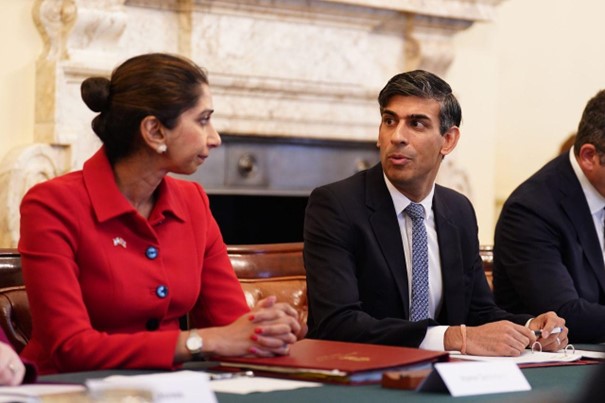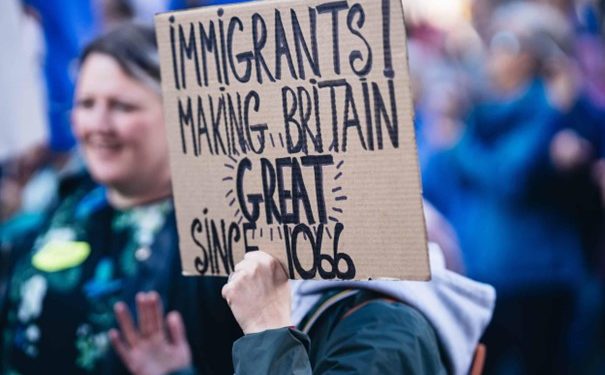Increasing migration movements bring along the rise of far-right and anti-immigrant movements in Europe. The electoral successes of nationalist figures such as Le Pen in France, Meloni in Italy, and Wilders in the Netherlands are quite concerning for the future of immigrants in Europe. The increasing hatred and xenophobia within society profoundly contribute to the spiral of violence and alienation in the region. Although anti-immigrant sentiment in Europe is often discussed in the context of far-right movements, there is a growing problem recently: European politicians with immigrant backgrounds support and implement anti-immigrant policies. While this may seem like a dichotomy in itself, it creates many complex sociological and political relationships. This is particularly evident in countries like the UK, where ethnic diversity is high. It brings the term “post-racial,” which indicates a period without racial prejudice and discrimination, to our attention in a neoliberal era where conventional patterns are broken.
As is well known, the UK is a country that receives a significant number of immigrants from different parts of the world. The relatively high economic and social prosperity compared to many other countries makes the UK a center of attraction for immigrants as well. The UK’s colonial and imperial legacy has resulted in a cosmopolitan society that makes it easier for immigrants to adapt to the existing multicultural and ethnic environment. However, although this process seems to be working in theory, there is also a strong reaction against immigrants, as in many other Western states. For example, Indian Prime Minister Rishi Sunak emphasizes that the country will no longer accept immigrants who come through illegal means, and there are also plans to send undocumented migrants arriving via the English Channel to Rwanda as part of a new treaty with Rwanda (“PM Sunak defends plan to send asylum seekers,” 2023).
We witness that former Home Secretary Suella Braverman, another Indian-origin political figure, strongly supports Rishi Sunak’s policies. Braverman defines the arrival of illegal and undocumented immigrants to the UK as an injustice, emphasizing that building a life in the United Kingdom should be through safe and legal migration and asylum routes, thus highlighting the reality of contradictory and strict immigration policies advocated by ethnic minority politicians. In this context, the implementation of harsh anti-immigrant policies by politicians from immigrant backgrounds in the UK presents a different discussion beyond far-right nationalist movements. This discussion revolves around the fact that anti-immigrant policies are shaped not by the “white supremacist” right-wing ideology but rather by the right-conservative wing represented by ethnic minorities.
The implementation of harsh anti-immigrant policies by politicians from immigrant backgrounds in the UK presents a different discussion beyond far-right nationalist movements.
In the UK context, not only politicians like Rishi Sunak and Suella Braverman but also Nadhim Zahawi, Sajid Javid, and Kemi Badenoch are among the most prominent figures of the transforming right-conservative politics. For example, the Secretary of State for Business and Trade, Kemi Badenoch, has supported Rishi Sunak’s anti-immigrant stance by calling for “much, much tougher” measures to be taken in response to increasing migration movements (“Kemi Badenoch pushes Sunak for ‘much, much tougher’ immigration measures,” 2023).
Shared Heritage and Britishness
The increasing ethnic diversity within the Conservative Party in the UK does not necessarily bring about a liberal and pluralistic perspective but rather reinforces a predominantly right-wing, traditional, and Britishness-supporting stance already inherent in the party’s ethos. This situation aims to reproduce the racial status quo that has become part of the Conservative Party’s agenda in a post-racial era and to legitimize this status quo through ethnic minorities. While theoretically, the dominant idea suggests that minority politicians should support liberal policies that are not anti-immigrant, the real issue is that a party such as the Conservative Party, which criticizes ethnic diversity and multiculturalism and is anti-immigrant and has racist tendencies at its core, has attempted to legitimize itself in this way (Begum et al., 2023).
In this context, if we were to claim that ethnic minority politicians view immigration policies from a White British perspective, based on Marx’s concept of “false consciousness” (Eyerman, 1981), it could lead us to overlook the complex relationship underlying this issue. However, we can analyze this complex relationship in the context of British colonialism, the “Commonwealth,” and the concept of “Britishness” maintained during the colonial and post-colonial periods. Commonwealth refers to the ties of friendship and practical cooperation Britain established with its former colonies during the post-colonial era (“Commonwealth,” 2024). At the same time, it also points towards the cosmopolitan structure inherent within Britain today as part of its colonial heritage, indicating the existence of a shared identity. This identity, particularly representing a symbol of the post-racial era, embodies a shared British identity that is fundamentally non-racial.
Invisible Colonialism
Although there is a focus on bringing British society together and highlighting its pluralistic structure through the promotion of Commonwealth and Britishness ideals, it reveals a different presentation of the fundamental principles bearing traces of the colonial era within British politics. As mentioned above, it can be observed that the idealized policies of politicians from immigrant backgrounds in the British Conservative Party do not necessarily guarantee racial justice despite the ethnic diversity. Therefore, we can argue that it manifests a dilemma where the principles deeply embedded in British politics, such as racism and xenophobia, are carried out through ethnic minorities in the neoliberal era. This dilemma arises as ethnic minority politicians in the United Kingdom attain significant positions, representing diversity and social progress while simultaneously promoting anti-immigrant and neglectful policies toward the rights of ethnic minorities (Begum et al., 2023). In other words, the implementation of minority and anti-immigrant policies that are embedded in British politics by minorities themselves signifies an invisible colonialism continuing in the post-colonial era, with the white British mindset (Walsh & Ferazzoli, 2023) in the background.
The implementation of minority and anti-immigrant policies that are embedded in British politics by minorities themselves signifies an invisible colonialism continuing in the post-colonial era, with the white British mindset in the background.

Suella Braverman and Rishi Sunak
Source: James Manning, Getty Images
Being the “Model” Minority
It is undoubtedly true that the prevailing understanding in the Western world, particularly in the UK, lies in discussions of race and class. In this context, the concept of “model minority” has also found its place in societal and political discourse. This concept suggests that immigrants who come to the country are subjected to a hierarchical system based on their skills/achievements. Moreover, their ability to speak English as well as a white, university-educated British and their integration into the hierarchical system further solidifies the perception of them as model minorities/immigrants. For instance, Ukrainian migrants are more easily integrated into British society than other migrants from Afghanistan, Syria, or Somalia who have fled war (Kirk, 2022). In addition, in this hierarchy of hegemonic whiteness, adherence to social conservatism and the white Protestant work ethic is also an important factor for the model minority. Politicians such as Rishi Sunak and Braverman have been rewarded for meeting this criterion (Begum et al., 2023).
Although Braverman emphasizes that the anti-immigration policies of the ruling Conservative Party are not about racism but rather about protecting the borders against the immigrant “invasion” that threatens the British “national” character, studies show the opposite (“Suella Braverman’s most controversial quotes,” 2023). It is very well-known that in British society, migration is still closely associated with race and racism, and even ethnic minorities who are born and raised in the UK are still at the center of the immigration debate. Strict immigration policies, visible and invisible everyday practices targeting minorities, and the use of anti-immigrant rhetoric contain a process that affects all ethnic minorities, particularly undocumented migrants (Khan and Weekes-Bernard, 2015), and perpetuates the existing debates. Therefore, it allows ethnic minorities to integrate with the White Conservative elite and gain politically important positions by supporting Britain’s anti-immigrant and post-racial discourses and actions. While it counteracts the negative connotations of immigration in British society and prevents the exclusion and marginalization of ethnic minority politicians, it also restructures the understanding of British nationhood and further emphasizes the importance of the Commonwealth concept. Hence, while British society maintains its character of white supremacy, it appears to include ethnic minorities in the center of society by acknowledging their contributions through the Commonwealth.
While British society maintains its character of white supremacy, it appears to include ethnic minorities in the center of society by acknowledging their contributions through the Commonwealth.
In conclusion, when we evaluate this complex structure of British politics, we can see why politicians from immigrant families are devoted representatives of anti-immigration policies.
References
Commonwealth. (March, 2024). Encyclopedia Britannica. Retrieved from https://www.britannica.com/topic/Commonwealth-association-of-states
British PM Sunak defends plan to send asylum seekers to Rwanda. (December, 2023). Aljazeera. Retrieved from https://www.aljazeera.com/news/2023/12/7/british-pm-sunak-defends-plan-to-send-asylum-seekers-to-rwanda
Eyerman, R. (1981). False consciousness and ideology in Marxist theory. Acta Sociologica, 24(1/2), 43–56.
Khan, O. & Weekes-Bernard, D. (2015). This is still about us: Why ethnic minorities see immigration differently. The Runnymede Report on Race and Immigration, 41.
Kirk, I. (June, 2022). Are attitudes to Ukrainian refugees unique? YouGov UK. Retrieved from https://yougov.co.uk/politics/articles/43122-are-attitudes-ukrainian-refugees-unique
Saini, R., Bankole, M. & Begum, N. (2023). The 2022 conservative leadership campaign and post-racial gatekeeping. Race & Class, 65(2), 55-74.
Suella Braverman’s most controversial quotes – from immigrant ‘invasions’ to the ‘wokerati’. (May, 2023). Independent. Retrieved from https://www.independent.co.uk/news/uk/politics/suella-braverman-controversial-quotes-migrants-woke-b2339097.html
Tory minister Kemi Badenoch pushes Sunak for ‘much, much tougher’ immigration measures. (November, 2023). Independent. Retrieved from https://www.independent.co.uk/news/uk/politics/rishi-sunak-immigration-kemi-badenoch-b2454083.html
Walsh, J. & Ferazzoli, M.T. (2023). The colonised self: The politics of UK asylum practices, and the embodiment of colonial power in lived experience. Soc. Sci. 12(7), 382.












































